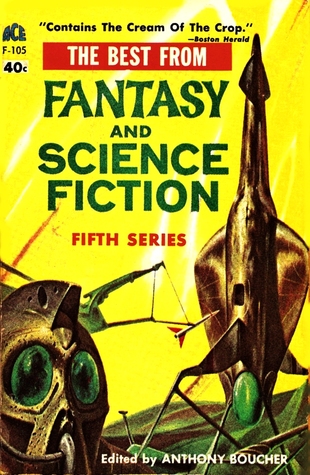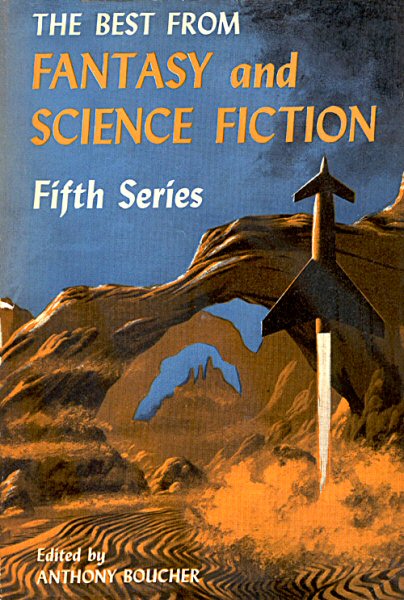

Anthony Boucher is the sole editor of The Best From Fantasy and Science Fiction, Fifth Series because J. Francis McComas stepped away after helping Boucher edit the first four volumes of this series. The most famous story in this volume is “A Canticle for Leibowitz” by Walter M. Miller, Jr. which would later be expanded into a classic SF novel.
I remember sitting in a Study Hall in the early 1960s reading the ACE edition of this book. When I read Zenna Henderson’s “Pottage”–one of her stories about The People who crash-landed on our planet and lived in fear of being discovered and killed–I remember my eyes getting misty. It’s a masterful story about a teacher and troubled children told with emotion.
I liked Anthony Boucher’s short short story “Nellthu” which is a variation on “The Three Wishes” motif. This series continues to present excellent stories with Boucher’s informative introductions. Recommended! GRADE: A-
Table of Contents:
- 7 • Introduction (Best from F&SF 5) • (1956) • essay by Anthony Boucher
- 9 • Imagine: A Proem • poem by Fredric Brown (variant of Imagine 1955)
- 10 • You’re Another • (1955) • novelette by Damon Knight
- 44 • Survival • (1955) • poem by Carlyn Coffin
- 45 • This Earth of Majesty • (1955) • short story by Arthur C. Clarke
- 59 • Birds Can’t Count • (1955) • short story by Mildred Clingerman
- 68 • The Golem • (1955) • short story by Avram Davidson
- 74 • 1980 Overtures • (1955) • poem by Winona McClintic
- 75 • Pottage • [The People] • (1955) • novelette by Zenna Henderson
- 113 • The Vanishing American • (1955) • short story by Charles Beaumont
- 125 • Created He Them • (1955) • short story by Alice Eleanor Jones
- 136 • Silent, Upon Two Peaks … • (1955) • poem by Anthony Boucher [as by Herman W. Mudgett]
- 138 • Too Far • (1955) • short story by Fredric Brown
- 140 • A Matter of Energy • (1955) • short story by James Blish
- 142 • Nellthu • (1955) • short story by Anthony Boucher
- 144 • Dreamworld • (1955) • short story by Isaac Asimov
- 146 • One Ordinary Day, with Peanuts • (1955) • short story by Shirley Jackson
- 157 • The Glass of the Future • (1955) • poem by Anthony Boucher [as by Herman W. Mudgett]
- 158 • The Short Ones • (1955) • novelette by Raymond E. Banks
- 181 • The Last Prophet • (1955) • short story by Mildred Clingerman
- 190 • Botany Bay • (1955) • short story by P. M. Hubbard
- 194 • A Canticle for Leibowitz • [Saint Leibowitz] • (1955) • novelette by Walter M. Miller, Jr.
- 220 • Lament by a Maker • (1955) • poem by L. Sprague de Camp
- 221 • The Doctrine of Original Design • (1955) • poem by Winona McClintic
- 222 • Pattern for Survival • (1955) • short story by Richard Matheson
- 226 • The Singing Bell • [Wendell Urth] • (1955) • short story by Isaac Asimov
- 245 • The Last Word • [Claude Adams] • (1955) • short story by Charles Beaumont and Chad Oliver
Co-founding editor McComas resigned in 1954, after the long gestation of the magazine and in its fifth year of publication…Boucher continues for five years as solo editor, and then passes the baton to Robert Mills, Mills having edited some of the Mercury crime fiction magazines and VENTURE SF.
Notable how much better the Doubleday cover is than the Ace, huh? This was the first BEST FROM I read, having picked up a jacketless copy of the SFBC edition from a secondhand store; the Damon Knight lead-off story “You’re Another” is one of his more brilliant but not too widely-remembered stories…”Too Fair”, like “Nellthu”, is a witty and well-turned joke vignette (no surprise from Fredric Brown), much as is Boucher’s…Asimov’s is a bit of a heavy-handed embarrassment in comparison. No accident that there are two Mildred Clingerman stories in the book, too, beyond Boucher’s advocacy for women writers. (The Clarke story’s original title was “Refugee”, but Boucher wasn’t happy with that and set up a reader contest to title it…the winner is an even better one, but Clarke had it reprinted elsewhere under his title, including, oddly enough, in his own collections.)
Or, even, “Too Far”!!
Todd, you’re right about Damon Knight’s “You’re Another.” Knight is an underrated writer. And there’s no doubt Boucher advocated women in the volumes he edited.
Amusingly, ISFDB has Completely botched the Clarke title confusion, partly through Clarke’s own sloppiness:
“Note: (Perhaps?) originally titled “This Earth of Majesty” by Clarke, given the name “Refugee” via a title contest in F&SF, reprinted in New Worlds as “Royal Prerogative”. Clarke’s introduction in The Sentinel collection states ‘Doubtless to the great confusion of anthologists, this story has been published under three other titles: “Royal Prerogative”,” This Earth of Majesty” and “?”. (Now, how do you index that?)’. LibraryThing states that it was ‘Originally published as “?”, it was later titled “This Earth of Majesty” and also “Royal Prerogative” by various editors. Clarke’s own title is “The Refugee”‘.’
Clarke’s title was presumably “Refugee” as that’s how it was published in THE OTHER SIDE OF THE SKY (his 1956 collection). “?” is how it was tagged in F&SF’s July 1955 issue, for the purposes of the contest, and “This Earth of Majesty” was the winner. I’ll admit I wasn’t aware that Ted Carnell also changed the title for a run in NEW WORLDS in the UK, in the January 1957 issue.
Clarke was never in the ASTOUNDING/ANALOG stable, perhaps in part because Clarke wasn’t going to take kindly to John Campbell’s editorial requests and demands…I should Go Look to see how many Clarke stories appeared in F&SF or NEW WORLDS after this title fiddling!
For that matter, “Refugee” (no “the” article) is apparently how it appears in THE SENTINEL (a 1983 retrospective collection) as well. (I don’t have a copy at hand to check.)
Todd, the TABLE OF CONTENTS of THE SENTINEL collection is:ntroduction:
Of Sand and Stars
“The Sentinel”
“Holiday on the Moon”
“Earthlight”
“Rescue Party”
“Guardian Angel”
“Breaking Strain”
“Jupiter V”
“Refugee”
“The Wind from the Sun”
“A Meeting with Medusa”
“The Songs of Distant Earth”
The Contributors
Todd, I’ve read about Clarke’s resistance to editorial “modifications.”
Thanks for the confirmation, George!
Also notable–neither the Beaumont nor the Jackson story is actually a fantasy or sf story…but Close Enough! I’d certainly buy them and include them in Boucher’s place, in both sites (the magazine and the resultant anthology). The kind of stories that probably could’ve fit into REDBOOK or ESQUIRE if a bit less Eccentric.
Todd, I think Boucher was demonstrating that women were welcome in THE MAGAZINE OF FANTASY AND SCIENCE FICTION.
Well, with Jackon, he’d be foolish to turn her work down from a publicity/sales perspective, as well…Beaumont, btw, was the first film columnist for F&SF…I think “William Morrison” was almost if not unique in the same years as F&SF’s live theater columnist, though others have dealt with “legit” theater in the fantastica magazines from time to time, including Ted White advocating for the triptych of plays WARP in an editorial in FANTASTIC (I think…possibly AMAZING) in the mid/late ’70s.
Todd, Boucher encouraged a mix of writers for THE MAGAZINE OF FANTASY AND SCIENCE FICTION. Other SF magazines, like ANALOG, seemed to feature a small group of Campbell’s favorite writers.
Another fine volume from F&SF. I read all these in their Acs editions in the 60’s. Excellent Damon Knight story. Underrated writer certainly. His best work is in his shorter fiction. His novels were mostly disappointing. Another underrated writer Walter M. Miller, Jr. with the excellent story that would make up the first section of his A Canticle For Leibowitz. He wrote a lot of good shorter fiction in the 50’s.
Knight wrote brilliantly at lengths from vignette to novella till the end of his career, and finally began turning out novels of the same caliber at the end of his career, such as CV and HUMPTY DUMPTY: AN OVAL. Though the short story that serves as the preface to A FOR ANYTHING is brilliant and despairing…pity about the the so-so Heinlein/Anthony Hope-pastiche novel which follows. Also a pity that Knight is not quite known to most people as the author of the better story that the less good TWILIGHT ZONE and SIMPSONS episodes “To Serve Man” are based on…not even Knight’s best joke story.
But, then, Jerome Bixby and (Mari)Lyn Venable are in the same boat…
Steve, you’re right about Knight and Miller. Very underrated writers! And they’re best in shorter lengths.
Not a bad F&SF anthology. I read the Clarke story as “Refugee”, whenever it was. If it’s the one I think it is, I like that Blish story.
Rick, these BEST FROM FANTASY AND SCIENCE FICTION anthologies keep getting better and better. Clearly, Anthony Boucher was a gifted editor and attracted some top-flight SF talent.
As Robert Silverberg, Barry Malzberg, Bill Pronzini, Algis Budrys and others have noted, at the time, at very least, the 1950s felt like the first “real” “Golden Age” of fantastic-fiction writing, in part because of the efforts of editors such as Boucher, but also because the writing in the fantasy and sf magazines often was finally on par with that found in any fiction venue, as well as writers who trained as writers in various ways (academically and pragmatically) were bringing their experience to what Budrys called “newsstand speculative fiction”…and the money was finally there for people to make a decent living writing fantastica for the markets primarily, though as usual as with most professional writing, some diversity of markets or second jobs helped. But one could make bread and butter money selling novels to Ballantine if also to a lesser extent Ace and suddenly a whole lot of other publishers for some years, F&SF paid modestly compared to FANTASTIC for a year or two and even GALAXY for half a decade, much less COLLIER’S or even BLUE BOOK, but 2c/word would go a Lot farther in 1952 than it would today. The residual condescension we see today toward fantastica so-labelled was that much stronger in the ’50s, but there were reasons to be proud…and by the end of the ’50s, WHO KILLED SF? A COMPOSIUM would win a Hugo award for the best nonfiction, essentially, of its year. Not artistically, mind you, but certainly the boomtown spirit.
Todd, I was subscribing to GALAXY, IF, WORLDS OF TOMORROW, AMAZING, and FANTASTIC in the Sixties. When I went to College at the end of that decade, I allowed the subscriptions to expire and only bought copies from time to time.
Or, at least, not Altogether artistically. But at times it felt thus.
The degree of fulfillment house/Post Office chewing up of my ALFRED HITCHCOCK’S MYSTERY MAGAZINE issues discouraged me from subscribing to other fiction magazines too often, but at least F&SF offered subs mailed in stiff Kraft envelopes, so I took them up on that from time to time in the ’80s and later. And the likes of WHISPERS could basically only be found via mail order (the magazine issues, rather than the eventual book volumes that ran alongside).
Todd, by the 1980s the fate of print SF magazines seemed to be Big Trouble Ahead. And, not just SF mags but mainstream periodicals like LIFE, NEWSWEEK, and TIME were in trouble.
It was in large part because corporate culture was expecting magazines and distribution to pay maximally to corporate ownership for minimal investment, or at best spotty Safe Bet investment. This doesn’t work all that well when one’s product is art, thought, news or even useful advice.